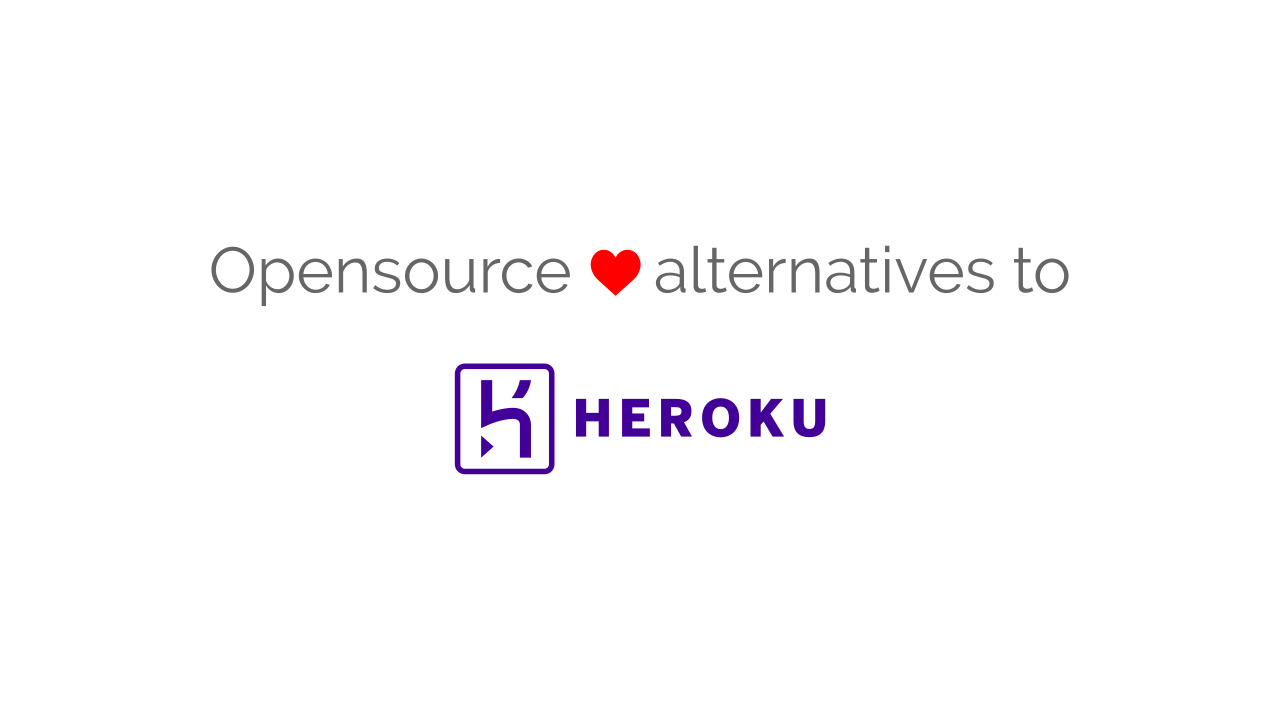The fact that you searched for Open source Heroku alternatives and discovered this post, itself mean a lot.
Either your Heroku bills have started biting you, 😅 or you are proactively looking for a better PaaS (Platform-as-a-Service) solution to future proof your stack. 😇 In either case, this post will quench your thirst with 5 of my favourite open source Heroku alternatives😛.
What is Heroku?
Heroku is a platform as a service (PaaS) that enables developers to build, deploy, and scale applications quickly on the cloud.
Heroku takes the headache of managing infrastructure away from you. It handles all the mundane work from creating servers to destroying them and everything in between.
Think of it as an extra DevOps member on your team. 😇
Deploying your app to the cloud is as simple as running a single command from your terminal:
git push heroku master
What does this mean for you? Less headaches and increased focus on things that genuinely matter, i.e. developing your apps and keeping your customers happy.
So why a Heroku alternative?
Those who have already faced the pain points of Heroku can feel free to skip this part and directly go below to 5 open source Heroku alternatives.
For those who are yet wondering why an open source Heroku alternative is needed:
Heroku is great for small projects.
And unfortunately, things end there as soon as your app starts scaling. 😪
1) Cost
Cost is a major deal-breaker for everyone actively looking for a Heroku alternative.
Heroku costs 3x-5x of an equivalent IaaS infrastructure setup. For example, a standard 1 CPU, 512 MB RAM will cost you $25/month on Heroku, whereas it is approx $5x/month on other cloud providers like Digital ocean.
This might not be a problem at a small scale. But as soon as your app starts scaling, your pockets begin feeling the heat, and that’s when most people look for Heroku alternatives. 😅
2) Flexibility
While Heroku is great for its ease of use, it takes flexibility away from you.
You can’t ssh into your servers. You can’t fine-tune the OS, the container size, the firewall and so on.
While this is not a major deal-breaker for most of the simple applications out there, but if your app is remotely complex, you can’t even start with Heroku.
3) Vendor Lock-in
If it wasn’t clear yet, one more burning reason to find a Heroku alternative is that Heroku locks you into their platform.
All the easy to use abstractions or features they provide are specific to their platform. They are not based on open standards or open source technologies. This is one more reason why you should find a Heroku alternative sooner than later.
There are many more reasons why you may want to look for a Heroku alternative. However, costs and flexibility are by far the most significant pain points of using Heroku in production.
5 Open source Heroku alternatives
While there are many Heroku alternatives in the market, I will be focusing only on the open source Heroku alternatives as they offer you maximum flexibility and no vendor lock-in.
Below I have listed 5 popular open source Herko alternatives in alphabetical order:
Caprover
CapRover is an extremely easy to use app/database deployment & web server manager.
Unlike Heroku, it does not have the git push functionality. But it does ship with a cli offering similar features.
Pros:
- Simple and easy to use UI.
- Easy deployment of MongoDB, Postgres and MySQL.
- Zero vendor lock-ins. Remove Caprover, and your apps still keep working.
- Nginx (fully customizable template) under the hood for load-balancing.
- LetsEncrypt under the hood for free SSL (HTTPS).
Cons:
- No direct integrations with CI systems or git as Heroku.
- Manual scaling.
- Docker Swarm, a tool Caprover uses under the hood, can prove to be limiting for advanced use cases.
When to choose Caprover:
If you are already comfortable with Docker Swarm and Nginx, you can choose Caprover as it is built on top of them.
Dokku
Dokku is a docker powered mini Heroku. It’s one of the first names that comes up on your screen when looking for a Heroku alternative.
It prides itself on being the smallest PaaS implementation you’ve ever seen. But don’t confuse its small size for fewer features. It provides just the right amount of features to help you build and manage the lifecycle of all your applications.
Pros:
- Simple to use.
- Heroku like git push functionality.
Cons:
- Works on single node only. No HA deployments.
- No UI.
When to choose Dokku:
If you are building a small side project or hobby project that won’t require scaling to multiple servers, then Dokku is perhaps the best Heroku alternative. For any production app where you might expect high traffic, you should check out other Heroku alternatives listed below.
Flynn
Like Dokku, Flynn is also pretty easy to use but without its limitations.
Think of it as a multi-node Dokku. 😇😛 In fact, one of the most common ways developers find Flynn is when they’re looking for an alternative to Dokku.
Even though Dokku is a widely-used open source Platform as a Service, its single host nature makes it unsuitable for production deployments. And that’s where Flynn comes into the picture.
When to choose Flynn:
Love Dokku but need high availability? Choose Flynn!
Pros:
- Multi node deployments.
- Has web admin and cli (doesn’t require you to ssh into the host to run commands).
Cons:
Rancher
Rancher is a complete container management platform for Kubernetes, giving you the tools to run Kubernetes anywhere successfully.
If you don’t know Kubernetes yet, its about time you look into it. 😅
In a nutshell, Kubernetes (K8s) is an open source system for automating deployment, scaling, and management of containerized applications. It’s battle-tested by companies like Google at scale and can fulfil all your requirements.
However, using Kubernetes requires a lot of technical expertise. Plus, you need to build a lot of stuff on top of it to experience all the benefits of a Platform as a Service.
That’s where Rancher fits in by providing a lot of value on top of Kubernetes like multi tenancy, centralized access control for admins, web UI, logging and monitoring.
Pros:
- Multi cloud deployments.
- Deploy helm charts directly.
Cons:
- Requires more technical expertise as compared to the above alternatives.
When to choose Rancher:
Want high availability? Already zeroed down on using Kubernetes on-prem? Choose Rancher!
Space Cloud
Space Cloud is an open source serverless platform that lets you develop, deploy and secure your apps on top of Kubernetes.
It has a Heroku-like single line deploy command to build and deploy your applications and an easy to use web UI.
Things like autoscaling, automatic HTTPS and traffic splitting are all supported out of the box.
While most PaaS solutions focus only on the deployment aspects, Space Cloud eases out the entire lifecycle by providing instant realtime GraphQL APIs on top of any database and microservice.
Security is a crucial aspect of any Platform as a Service. This is where Space Cloud excels as compared to all the above Heroku alternatives. It provides security on both the platform as well as the application level.
Pros:
- Auto scaling (including scale down to zero).
- Zero trust security. End to end encryption (including internal service to service communication)
- Automatic HTTPS (Letsenctypt).
- Realtime GraphQL APIs on top of any database and microservice.
- Easy setup and configuration via cli and web UI.
Cons:
- Doesn’t bootstrap a Kubernetes cluster for you as of now.
- Smaller community. (2K Github stars and 200+ Discord members)
I am one of the the co-founders of Space Cloud. So you would be a better person to judge its cons than me. 😅 Try out Space Cloud today with this step by step interactive guide and let me know how can we improve it! Don’t forget to star us on Github if you like Space Cloud.
When to choose Space Cloud:
Love Kubernetes but want an easy abstraction on top of it? Want to ship out new features faster by reducing both the development and operation time? Choose Space Cloud as a Heroku alternative!
Conclusion
We just discussed some of the open source Heroku alternatives ranging from Docker based PaaS like Dokku to a more production-ready Kubernetes based platform like Space Cloud.
Choosing a solution depends on your needs. While a Dokku like solution might be a good Heroku alternative for small hobby projects, you should consider something like Rancher or Space Cloud if you want high availability and advanced functionalities.
As you might have already noticed by now that I have tried hard to rank high for terms like Heroku alternatives and Open source Heroku alternatives 😂. Anyways if you loved this article, help me spread the word by tweeting 5 open source heroku alternatives.
Feel free to reach out to us on our Discord server or directly put a comment below.











